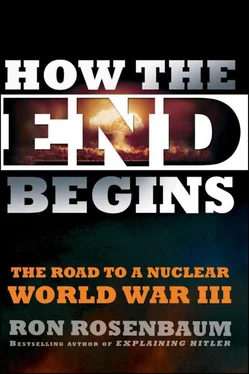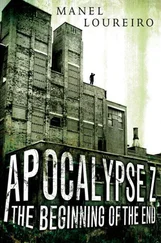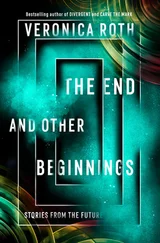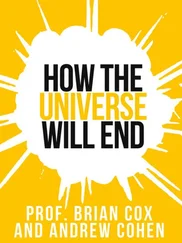“Is that well known?”
“No, but it’s… I think, a few people have. It’s been out there, but never—you know how these things are—never really crystallized…”
It’s not just that the decision to launch rests with one person, the president, it’s the fact that the president’s choices are predetermined or at least preselected by a nuclear priesthood.
“There’s so much kept secret by the nuclear priesthood that even secretaries of defense and presidents don’t even know what’s going on.”
He speaks of an encounter with Robert McNamara in 1980. As secretary of defense, McNamara had become obsessed with installing Permissive Action Links (PALs) on every American nuclear warhead, which meant they couldn’t be launched without an explicit properly encoded order from above. Blair portrays McNamara as shocked upon learning from Blair that they had not been installed or made operational until long after he left office, after 1976. [304]
“Think of this example, of McNamara thinking they had installed those PAL links [which require affirmative order from above to release launch codes] on the system—it’s just one of the examples.
“Then the fact that it’s not necessary anymore to have these arsenals. It’s in our national interest to get rid of them. If we could get rid of a lot them in particular it would clearly be empowering. We have so much soft power and conventional military power that nuclear weapons in the possession of other countries, counteracts, doesn’t neutralize but severely levels the field.”
In other words, our strengths would be even more overwhelming in a nonnuclear world because we couldn’t be threatened by nukes.
“Not that I’m in favor of having preponderant power over the world, but nuclear weapons clearly don’t help us, they’re not usable. We can’t use them against terrorists if we want to because we can’t identify their location and if we could we wouldn’t need nuclear weapons to get them out. If you just do this sort of net assessment off the military utility, nuclear weapons come up, really, Zero.”
Zero. It has become, since his revelation, his one word, his watchword. I can’t help thinking of the serendipity of the name of his partner in Zero: Nunn.
“Was this something that came to you cumulatively and then—”
“Yeah, yeah, right,” he says. “In just the last few years I’ve been doing the calculations of the lethality of conventional forces and what nuclear missions can now be carried out with conventional weapons. And it’s clear they can do virtually everything a nuclear weapon can do.”
He hesitates. “And there’s this… the Cold War is over it’s hard to justify it. There’s the morality issue. I mean it’s one thing to rationalize the threat to use nuclear weapons that could kill hundreds of millions of people during the Cold War. I mean that rationale for the threat is something to debate, but to actually carry it out would have been clearly, clearly in my mind now in retrospect, not only immoral but illegal.”
“It would have been a war crime?”
“It would have been a war crime. So, you can’t carry it out and now I don’t even think you can even threaten to carry it out. At the end of the Cold War there’s no logic to this, no rationale to it. We’re trying to get ourselves into some new deterrent relationship with China to provide a… to refresh the rationale for deterrence, but that’s totally misguided and unnecessary, huge mistake. And we’ve got to sort of clamp down on this kind of expansion of Mutually Assured Destruction deterrence.”
“What are the signs,” I asked, “that we’re using China that way. It was restored to the SIOP [Single Integrated Operations Plan] in—”
“January of ’98. And increasing the focus on China, adding more and more targets all the time, trying to justify our large nuclear force, even though China has like twenty long-range missiles capable of reaching the United States.”
It is personal for him. “The immorality of… I think of my daughter… there are women now who are launch officers and I think of my children being put in a position today of doing what I did and I just don’t think the rationale stands up, and deterrence is not a plausible argument. There’s no plausible argument. And it’s immoral for us and totally lacking in vision for us to be putting our kids in this position today, twenty years after the fall of the Wall.”
“So looking back at your role,” I asked him, “when you were a crewman, going down the checklists, you now think that what you were being asked to do was profoundly immoral?”
“Yeah. To launch nuclear—”
“To be part of this system?”
“—armed missiles which would kill millions of people.”
“And you didn’t necessarily think that until recently because you thought it might have been a flawed system but the system in some way had some rationale…”
“It was the rationale of deterrence that you would never have to do that.”
“It did seem to work, but we don’t know whether it worked because of luck or design.”
“Yes, all these counterfactual problems and history… I think the absence of a nuclear attack against the United State was probably over-determined by a range of forces including nuclear deterrence to some extent. You know you can make a case that there was a deterrent effect but it’s that deterrent effect in retrospect was not sufficient, I think, to justify ever actually using nuclear weapons, implementing the war plan.”
Few of us will ever know what it was like to hold operational launch keys. But in a sense Bruce Blair and his successors at the Minuteman consoles have been our surrogates, carrying out what the policy of officials we have elected and reelected for more than half a century have designed. But we were all at a distance. They were there, people like Blair, our stand-ins, heavy metal keys in their hands. Still weighing heavily on Blair’s conscience.
“We’re still asking people, young kids, to do what you were asked to do,” I said to him.
“Yeah, and the justification has just completely disappeared,” he said. “I would have to tell my daughter, a sophomore in engineering at Michigan who once considered, not too long ago, going to one of the military academies, getting a free education and good education. Might have wound up doing this and I would have to say, ‘You can’t do that.’ You would have to sign the thing saying this is against my conscience [to get out], which some people [did] even back during the Cold War.”
“They offered it to everyone who had access to a key?”
“You had to sign [something else], by the end of your training at Vandenberg Air Force Base, to learn how to carry out nuclear war plans, before you graduated and went on to a combat assignment, places like Montana. You had to sign a piece of paper saying you would carry out the order.”
“Not just carry out orders, but…”
“No, it was specific to the job that we would carry out the order to fire nuclear missiles. I don’t know exactly what the wording was but it clearly—”
“You are joining our nuclear strike force and you agree that you have no res—”
“And I seem to recall that we actually were asked to sign that after the first week or so of training where we were presented some of the, I think, very watered down—”
“Films? I remember one of the crewmen talking about films.”
“Films. They showed films. It was very… showed the films of nuclear bombs going off and blowing over—you know [shacks] at the Nevada test site, or else they were blowing over sand and little garages. They were designed to test your stamina, endurance. And we signed that and went on. I mean it was never any really true deep conversation. This was as you can imagine just about as superficial as it could possibly be.”
Читать дальше











